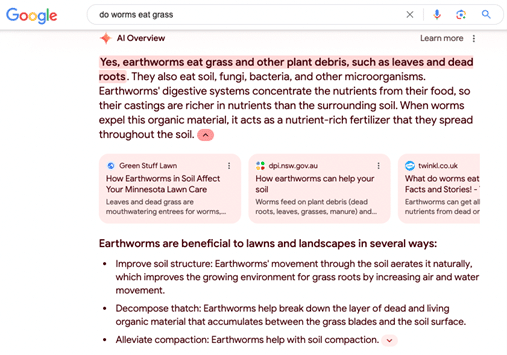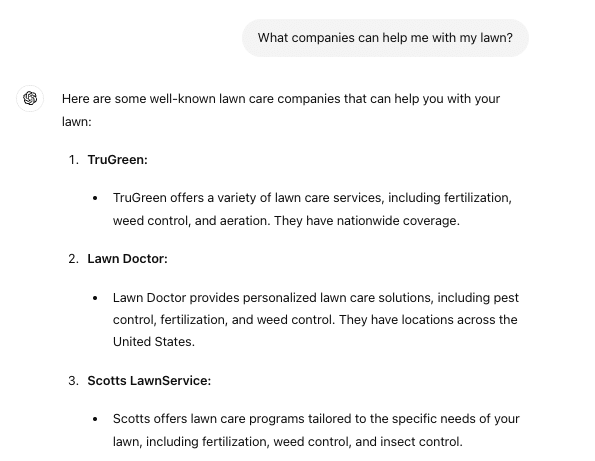Over the past 10 years, digital marketers have felt compelled to “level up” their SEO strategies by reacting to bad data, misleading insights and misusing tactics that could improve an already shaky strategy.
For example, say your website is ranking for an informational keyword that drives a boatload of traffic from a search audience that’s not going to convert. Let’s use the keyword “do worms eat grass” as an example.
IMAGE: UNSPLASH
If you’re ranking in the AI Overview or featured snippet on Google, you have hundreds of visitors landing on your site, reading about worms, then immediately leaving the site.
This is going to reflect poorly in the site’s engagement metrics inside Google Analytics 4. And if you have conversions or key event tracking turned on, this is will impact the site’s overall conversion rate.
All of this data will be a sign to a digital marketer that they need to improve user experience on the page to satisfy what the searcher is looking for or what they might engage with.
This has led them down the road of something called “Search Experience Optimization (SXO).” They claim it’s about enhancing the user experience for both the visitors we attract and the ones we aim to get. Focusing solely on preferred visitors overlooks the potential value in those we already have, leading to missed opportunities for growth and engagement.
Why SXO Is Not About UX
The problem with this way of thinking is that the searchers Googling “do worms eat grass” are likely not in a position to reach out to a lawn care or pest control company for a service.
If the ultimate goal of your website is to drive leads, no matter how much heat-mapping, A/B testing of button color or calls-to-action you put on a page that’s ranking for “do worms eat gress,” this page will never drive more conversions and new business.
This is why the traditional definition of SXO was invented to cover up bad SEO. Good SEO already takes user intent into consideration. When your website intends to drive new leads for your business, your SEO strategy should revolve around search traffic with the same intent.
How Should We Define Search Experience Optimization (SXO)
The main differentiator is the term “experience.” While SEO focuses on “search engines,” SXO focuses on the searcher’s experience online. Where are they going for information?
The key to search experience optimization is knowing where your audience searches for answers and making sure your content meets them there. This requires a deep dive into user behavior and preferences across various platforms.
Search engines are no longer the sole place searchers are going for information. Various technologies have hit the market over the past 5 years and swung people away from the Googles and Bings of the world.
TikTok has become one of the most popular social media platforms in the world and increasingly more and more users are using the search bar to learn more about topics and gather answers, context and inspiration.
ChatGPT became available to the public in 2022 and now receives nearly 200 million users on a monthly basis. Many of these people are treating it like they would Google Search.
Having a well-optimized website isn’t enough; your brand needs to be visible and engaging wherever your potential customers are looking.
Take, for example, someone searching for lawn care services. A homeowner might start by asking Google Assistant for recommendations. They might then check out reviews on Yelp or Nextdoor to see what their neighbors are saying.
Some might look for tips and tutorials on YouTube or Instagram, while others might browse Pinterest for landscaping ideas.
SXO ensures your lawn care service is optimized for discovery on all these platforms, making it easy for potential customers to find and choose your services.
By understanding and targeting these various touchpoints, you can connect with a wider audience and meet them exactly where they are.
The next iteration of Search Engine Optimization (SEO) is Search Experience Optimization (SXO). Have you started to consider how people are searching for your product or service online?
Digital Marketers – The Real Goal Of SXO
The ultimate aim of SXO is to craft high-quality content that your audience is actively seeking and ensure it’s easily discoverable across all relevant platforms. Here’s how to achieve that:
Content Relevance and Quality: Create valuable, relevant content that addresses your audience’s questions and needs. Understand their pain points and interests, then provide solutions and insights that truly resonate.
Platform-Specific Optimization: Tailor your content to meet the unique requirements and best practices of each platform. This might mean varying formats, tones, or engagement strategies depending on whether it’s for a blog, social media, or an AI assistant.
Continuous Monitoring and Adaptation: Keep a close watch on your content’s performance across different platforms and be ready to make adjustments as needed. Use analytics tools to track engagement, traffic, and conversions, and stay updated on the latest trends and algorithm changes.
Building Authority and Trust: Establish your brand as a credible and authoritative source of information. Consistently produce high-quality content, engage with your audience, and earn backlinks from reputable sites.
By focusing on your Search Experience Optimization strategy, you can ensure your content not only reaches your audience but also resonates with them, building trust and driving engagement across multiple channels.




COMMENTS